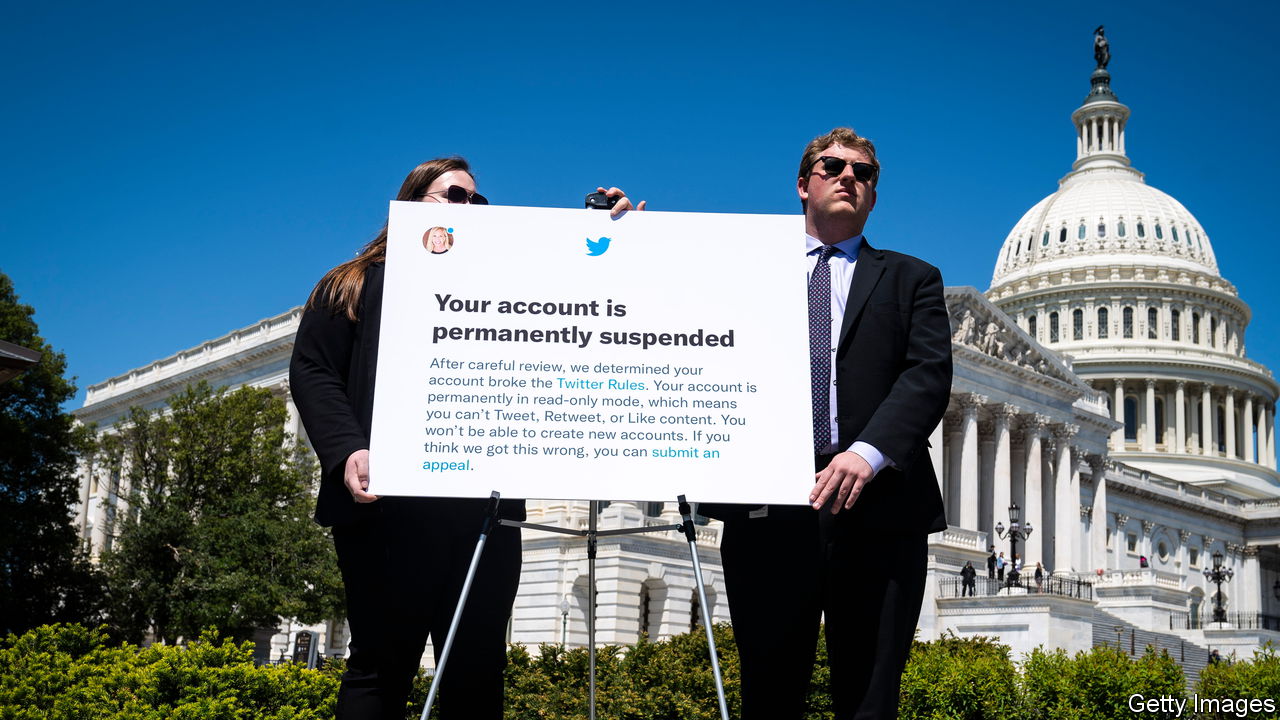BACK WHEN X was still Twitter, Ron DeSantis, Florida’s governor, was no fan of the social-media company. In May 2021 he heralded his signing of Senate Bill 7072 as a strike against censorship. Residents of Cuba and Venezuela may be victimised by “tyrannical behaviour”, he said, but Floridians will now be “guaranteed protection against the Silicon Valley elites”. By “taking back the virtual public square”, the state’s lieutenant-governor, Jeanette Nuñez, added, the law will rescue discourse from a “radical leftist narrative”.
In May 2023, with Twitter rebranded and in Elon Musk’s hands, Mr DeSantis opted to launch his ill-fated presidential campaign on the site, and X’s content moderation has been overhauled. But Senate Bill 7072 remains on the books, along with a similar law, House Bill 20, enacted in Texas in September 2021. Challenges to both laws—based on the free-speech guarantee of the First Amendment—come to the Supreme Court on February 26th.
The plaintiffs in NetChoice v Paxton and Moody v NetChoice contend that Texas and Florida are unconstitutionally intruding on private companies’ decision-making about speech they host on their sites. NetChoice represents giants like X, Facebook, Google (owner of YouTube) and TikTok, as well as smaller platforms like Etsy and Pinterest. It argues that “governmental efforts to interfere with the editorial discretion of private parties is forbidden censorship.”
The laws prohibit removing and “shadow-banning” users on large social-media platforms. (Florida’s applies to those with more than 100m active users; Texas sets the floor at 50m.) Texas bars sites from censoring posts based on “viewpoint”; Florida protects users from “inconsistent and unfair actions”. The Sunshine State takes particular aim at sites that ban candidates for state office, a move that can draw fines of up to $250,000 a day. Other violations could expose sites to lawsuits with damages up to $100,000 apiece. Both laws also impose detailed reporting on content moderation—requirements the sites say are “enormously burdensome” but the states insist are “quite modest”.
Two district courts sided with NetChoice’s First Amendment claim, but their respective appellate courts did not see eye to eye. Florida’s law remained blocked by the Eleventh Circuit Court of Appeals. Texas, meanwhile, prevailed at the Fifth Circuit but the Supreme Court granted NetChoice’s request to temporarily freeze HB 20. Now the justices will give the matter a full review.
The tricky question at the heart of these cases is how to conceptualise social-media companies. Are they akin to newspapers, which have total control over which stories appear in their pages? Or are they closer to phone companies or delivery services, which must (with few exceptions) transmit whatever messages or packages their customers wish to dispatch?
The Supreme Court decided in 1974 that Florida could not require newspapers to publish responses from political candidates who had been criticised in their editorial pages. Two decades later it ruled that organisers of a St Patrick’s Day parade did not have to let a gay-pride group march along the route. And last year it allowed a web designer to turn down clients seeking websites for same-sex weddings.
These and other rulings suggest that the First Amendment protects both individuals and businesses from being compelled to communicate ideas with which they disagree. But Florida and Texas say that the likes of Facebook and YouTube are neither publishers nor private citizens but “common carriers” and can be made subject to neutral rules of content moderation. By doing business with all comers, the platforms “can be required to open [their] doors on equal terms to all”—a duty that may be heightened by what the states characterise as “monopoly power in their respective markets”.
As “platform[s] for all ideas”, Texas argues, large social-media sites are easily distinguished from choosy publishers or even bookstores, which can decline to stock any title for any reason. Unlike a cable-television provider or cinema, which “carefully selects and compiles the materials it presents”, Facebook and TikTok (by and large) let their users post what they like. Given the “vastness and diversity” of that content, Florida argues, there is no chance anyone would mistake the views of those who post for those of the companies that host.
Sorting out whether YouTube is more like the Miami Herald, a cinema or AT&T is at the heart of the tangle before the Supreme Court. But differing claims to free speech are also in play, which helps explain why the politics of the NetChoice cases are interestingly scrambled. Although the Florida and Texas laws arrived in a swirl of anti-woke rhetoric, Scott Keller, a conservative former Texas solicitor-general, argued against the Lone Star State’s social-media crackdown at the Fifth Circuit. And odd bedfellows will be arguing alongside one another for NetChoice at the Supreme Court: Paul Clement, the foremost litigator of America’s conservative legal movement, and Elizabeth Prelogar, President Joe Biden’s solicitor-general. ■

 Blog Post6 days ago
Blog Post6 days ago
 Accounting1 week ago
Accounting1 week ago
 Economics1 week ago
Economics1 week ago
 Personal Finance1 week ago
Personal Finance1 week ago
 Economics1 week ago
Economics1 week ago
 Personal Finance1 week ago
Personal Finance1 week ago
 Accounting1 week ago
Accounting1 week ago
 Finance1 week ago
Finance1 week ago



















